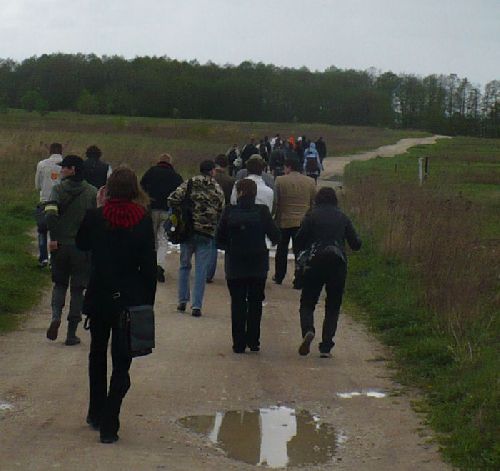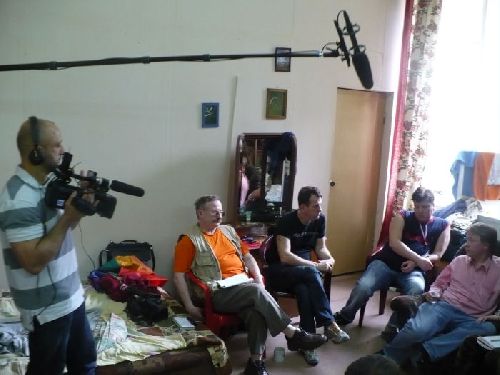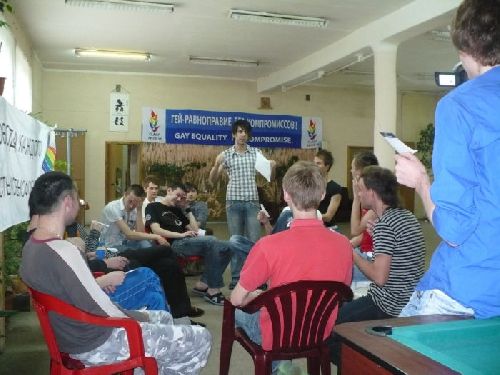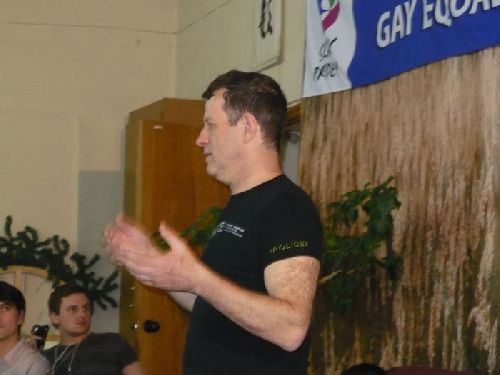Chicago Indymedia : http://chicago.indymedia.org/archive
LOCAL News :: Gender & Sexuality
Threats Mount Against Gay Pride in Moscow
Friday, May 15 – One Day Before Gay Pride
MOSCOW – A front page headline in Moskovskij Komsololets, one of Moscow's major dailies, on Wednesday read "Lesbians Came to Marriage Registration Bureau Before Gay Pride," with a sub-headline of "In Moscow, rise in publicity about gay pride."
A few pages inside, another article countered with a headline of "Homosexualism 'Weakens Power of Fist': Activists Against Gay Pride Threaten Violence."
MOSCOW – A front page headline in Moskovskij Komsololets, one of Moscow's major dailies, on Wednesday read "Lesbians Came to Marriage Registration Bureau Before Gay Pride," with a sub-headline of "In Moscow, rise in publicity about gay pride."
A few pages inside, another article countered with a headline of "Homosexualism 'Weakens Power of Fist': Activists Against Gay Pride Threaten Violence."
Click on image for a larger version
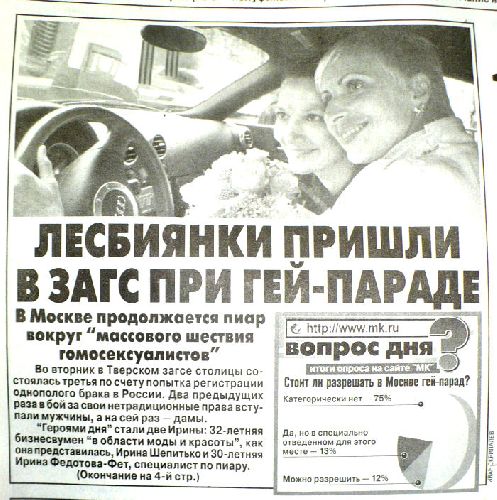
Moskovskij Komsololets article about first equal marriage action in Russia
The second article told of a press conference by fascists in which they promised that 1000 of them will protest against gay pride this Saturday and would physically attack it if possible. In previous years they violently attacked gay pride participants, sending German European Parliament member Volkhart Beck to the hospital in 2006, doing the same to veteran British gay rights campaigner Peter Tatchell in 2007. This year the Pride event has been banned once again, with the Moscow police chief threatening to arrest all of the participants.
On Thursday a reporter for Moskovskij Komsololets told gay organizers that police had told them that they would arrest lead Moscow organizer Nikolai Alekyeev today, attempting to decapitate the leadership of our "Slavic Pride" action on Saturday.
Fortunately, Alexyeev and his colleagues anticipated the government's action, and the last place you will find him and any of the other key organizers is at their flats or workplaces. All likely means of tracing their locations have been disabled, thus far forestalling pre-emptive government repression against tomorrow's Slavic Pride action. "Security culture" has been carefully and calmly organized, with all of us sequestered at a safe location while we hold a two-day conference and training session for tomorrow's pride action amidst the high-profile "Eurovision" song contest.
The first day of the conference featured political discussions about Slavic Pride — why we are doing the action and how it came to be. Several speakers noted that in each country there is a basic political division among gay organizers between those who see the need to take action against the repression of gay rights organizing, versus those who say that it is enough to simply allow "gay culture" -– clubs, coffee houses and the like — to proliferate, and that this alone would be sufficient to bring about change. "The gay movement in Belorussia is also separated into separate blocs, some [who] are in favor of action, others [who] are not," said Belorussia leader Sergey Androsenko.
In the United States, this same debate is mirrored between those who say that we need to proactively organize actions against things like Proposition 8 and doing sit-ins and the like, versus those who say that gay marriage is "inevitable," with the implication being that all we have to do is wait, or passively support politicians who will bring the change for us.
"You can't change the community by closed situations, only [the] open fight for your rights can change [the] situation in society," said Alekseev. "If you aren't open, your relatives, the media doesn't know, they need live examples." Tatchell, noting the enormous progress that LGBT people in Britain have made over the past few decades, explained that how they got there was by "Doing many direct action protests and like Slavic pride, getting lots of publicity which raised public awareness, provoked public debate and put pressure on the authorities. So the tactics that you are using here today in Moscow are similar to the ones we used successfully in Britain — direct action and public protest get results."
Those in the "change is evitable" camp fail to understand that history does not always move forward, unerring leading to greater rights. In my greetings to the conference from Chicago's Gay Liberation Network, I noted that the economic crisis gripping the world poses additional challenges for lesbian, gay, bi and trans (LGBT) rights organizers. Far right organizers, such as those we will likely encounter tomorrow, are dangerous enough during "normal" times. When large numbers of people are losing their jobs and savings, history has shown that fascist organizers can gain many more adherents and greatly increase the threats they pose to sexual, national and religious minorities. Organizing bold pro-equality counter-messages becomes that much more important.
Doing so amidst state repression and limited openings for democratic organizing of any kind is a real trick. "We want to minimize the negative consequences" to the Pride participants, said Alekseev. Today's part of the conference will be aimed at carefully organizing and training ourselves for tomorrow's action so that we get "maximum exposure of mass media and minimum consequences to the participants."
Some of that was already achieved by the action of two lesbians at the Moscow equivalent of a marriage license bureau. While a press conference by the fascists the same day was relatively downplayed, the marriage license bureau action, "the first attempt at homosexual marriage in Russia" had "about 40 [still] cameras and 30 TV cameras," said Alekseev.
Moscow organizers noted that the numbers of fascist counter-protesters have diminished at each of the previous three Pride events in the city, with 1000 violently attacking the event in 2006, two hundred attacking in 2007, and only about 50 counter-protesting last year. What effect the economic crisis and the government's heightened belligerence will have on tomorrow's Pride event is anyone's guess.
Regardless, veteran campaigner Peter Tatchell in his greetings on behalf of Britain's Outrage direct action group, aptly saluted the bravery of tomorrow's Pride participants, most of who appear to be in their early 20s. "We had police harassment [in Britain], but nothing on the scale that you have experienced here and in Belorussia. And so all my comrades in Outrage want to say to you, we send you our solidarity, we salute your courage, and we together are part of a world movement that will win queer freedom."
Already some progress has been made. Gay rights organizing in Russia did not begin with the Moscow 2006 Pride action. In 1986, Vladmir Ortanov founded Russia's first gay newspaper and in 1991 Russia saw its first Pride festival in St. Petersburg, even though homosexuality was still illegal and punishable by up to five years in prison. Even though young people are the overwhelming majority at today's conference, veterans like Ortanov shared their history so that the younger activists could see how tomorrow's action fits into the larger picture of struggle for gay rights and democracy in Russia.
"We are on an historical mission, it is a huge responsibility," said Alekseev. "The evolution of LGBT rights in Russia will depend on what happens on 16 May."
Despite threats of arrest and physical attacks by fascists, Slavic Gay Pride will take place at 1 PM tomorrow (Saturday) at a soon-to-be-disclosed location in downtown Moscow.
The eyes of much of the world's media are already on Moscow covering the finals of the Eurovision Festival. President Medvedev, Prime Minister Putin and Mayor Luzhkov will have the choice of either confirming the world's worst suspicions about Russian "democracy" by arresting the participants, or they can step away from that abyss by allowing LGBT people to assemble without state repression.
++++++++++++++++++++++++++++++++++++++++++++++++
See the first article in the series, and more pics, at: http://chicago.indymedia.org/newswire/display/86605/index.php
Information Library
Views
Search
Account Login
Media Centers
- worcester
- western mass
- vermont
- urbana-champaign
- tennessee
- tampa bay
- seattle
- sarasota
- santa cruz, ca
- santa barbara
- san francisco bay area
- san francisco
- san diego
- saint louis
- rogue valley
- rochester
- richmond
- portland
- pittsburgh
- philadelphia
- oklahoma
- nyc
- north texas
- north carolina
- new orleans
- new mexico
- new hampshire
- minneapolis/st. paul
- milwaukee
- michigan
- miami
- maine
- madison
- la
- kansas city
- hudson mohawk
- houston
- hawaii
- dc
- columbus
- colorado
- cleveland
- chicago
- charlottesville
- buffalo
- boston
- binghamton
- big muddy
- baltimore
- austin indymedia
- austin
- atlanta
- asheville
- arkansas
- arizona
- valencia
- united kingdom
- ukraine
- toulouse
- toscana
- torun
- switzerland
- sverige
- scotland
- sardegna
- russia
- romania
- roma
- portugal
- poland
- piemonte
- patras
- paris/Île-de-france
- oost-vlaanderen
- nottingham
- norway
- northern england
- nice
- netherlands
- napoli
- nantes
- marseille
- malta
- madrid
- london
- lombardia
- linksunten
- lille
- liguria
- liege
- la plana
- italy
- istanbul
- ireland
- hungary
- grenoble
- germany
- galiza
- euskal herria
- estrecho / madiaq
- emilia-romagna
- cyprus
- croatia
- calabria
- bulgaria
- brussels
- bristol
- belgrade
- belgium
- belarus
- barcelona
- austria
- athens
- armenia
- antwerpen
- andorra
- alacant
- abruzzo
This site made manifest by dadaIMC software



